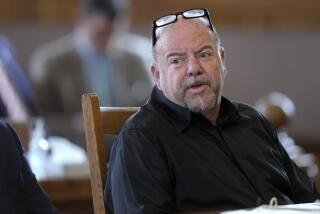Regulators Want Phone Firm to Quit Operating
State regulators said Tuesday they are preparing to force a telephone company operated by a former Orange County man to quit doing business in California for three years and to pay back 56,000 customers who were illegally switched from other carriers.
The victims, including thousands of unsuspecting Latino and Asian immigrants living in Orange, Los Angeles and San Diego counties, would receive refund checks of about $35 each and would be entitled to get back any excessive charges on their long-distance bills.
The penalty, expected to be approved by the Public Utilities Commission when it meets today in San Francisco, would effectively shut down San Diego-based Communications Telesystems International. The firm is better known to its customers as WorldxChange, and for its âTalk Centsâ advertisements.
The action will mark the third time in less than a year that state regulators have forced a telecommunications company to completely stop its business operations for engaging in an industry practice known as âslammingâ--the unauthorized switching of customers from one telephone company to another.
âUnfortunately, the telecommunications industry has recently attracted an incredible number of unscrupulous entrepreneurs who are shamelessly ripping people off,â said Larry McNeely, supervisor of the PUCâs consumer services division.
âBut this companyâs actions were pernicious even by those standards,â McNeely added. âIt slammed customers, then slammed them again after they complained about being switched. And, as immigrants, these people were among the most vulnerable of all.â
Under terms of the proposed order before the utilities commission, WorldxChange also must notify all its customers to find a new telephone company and bear the cost of transferring them to other carriers.
âItâs the strongest anti-slamming decision ever reached by this commission and possibly by any commission in the country,â said Robert Gnaizda, general counsel and policy director of the Greenlining Institute, a multiethnic public policy and advocacy organization in San Francisco.
âIt not only sends a strong message to telephone slammers, but I believe it was a preemptive strike by the commission for when energy deregulation begins in 1998 and itâs my opinion the commission was well aware of that.â
Regulators said the company was the brainchild of Roger B. Abbott, 39, who served three years in state prison after a 1982 conviction for cocaine trafficking in Orange County. Court records show he drove a red Porsche at the time with license plates that read âCRACK.â
WorldxChange incurred more slamming complaints than any other in California, and perhaps the country, regulators said. Abbottâs company took in more than $200 million a year in revenue, according to testimony at a PUC hearing.
The company paid Abbott and his wife salaries of $2.9 million a year, enough to support a lavish lifestyle that included a 10,000-square-foot mansion with pool and tennis court in Rancho Santa Fe, regulators said.
Neither Abbott nor his attorney, Eric Lipoff, returned calls for comment.
The company specifically targeted Asian communities in Orange County and Latino neighborhoods throughout Southern California, McNeely said.
According to PUC records, there were 7,668 victims in the 619 area code; 6,966 in 213; 4,266 in 714; 2,808 in 818; 2,621 in 310; and 1,423 in 909.
Nghia Tran, an Orange County activist who represents Vietnamese consumers who complained to the PUC, testified that WorldxChangeâs telemarketers persuaded customers to switch their phone service and promised large savings that never materialized.
The companyâs âStay With Usâ feature infuriated consumers because once they discovered their phone service had been switched and they had called to cancel, WorldxChange would immediately switch them back, later claiming they had enrolled in the unusual marketing program.
âThese people just didnât understand what was happening to them,â PUC investigator Stormy Maddux said. âThey just knew something was terribly wrong.â
More to Read
Sign up for Essential California
The most important California stories and recommendations in your inbox every morning.
You may occasionally receive promotional content from the Los Angeles Times.










